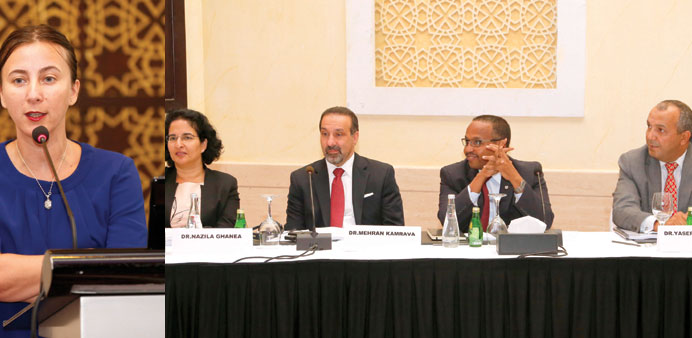A team of experts that carried out studies on the “domestic effects of the international human rights treaty ratification in the GCC states” has suggested that “international reporting” and “institution building” are essential for building momentum to legalise human rights in the region in a meaningful way.
At a meeting held yesterday, the team members recalled what they saw and experienced from their interactions with people at different levels in each of the GCC states during their two-year project work.
The team, it was explained, worked under the patronage of the Qatar National Research Fund (QNRF), an initiative of Qatar Foundation.
Among the recommendations made by the team were those pertaining to building on the track record of actions taken with respect to combating trafficking and access to services, towards legal protection for other human rights.
The team sought to clarify the status of international human rights treaty provisions in the domestic legal system. Deeper implementation of existing ratifications, regular reviewing of the existing reservations and establishment of permanent inter-ministerial bodies focused on human rights were among the recommendations.
The necessity of giving meaningful access to human rights remedies to one and all living in the GCC states has been highlighted in the report.
The importance of empowering the national human rights institutions in member states received adequate attention.
The need of strengthening NGOs to promote, protect and ensure legal access to human rights is also highlighted.
National human rights institutions (NHRIs) in the GCC region were told to support and take part in human rights litigation. The NHRIs were asked to monitor judicial proceedings at all levels.
Judges and lawyers were urged to develop a pro bono human rights culture to assist in upholding international human rights obligations.
The legal professionals were asked to carry out exchanges and dialogues with constitutional and human rights lawyers in other regions and also assist in the building of civil societies.
Civil societies need to aid in the promotion, protection and enjoyment of human rights of all, including non-citizens, it was told.
The civil societies should consider sending shadow reports to UN treaty body committees as well as participating in the events held at intervals in Geneva.
The societies need to consider collaborative projects with neighbouring or other international NGOs.
The GCC states were told to promote the compatibility of the GCC legal regimes with international human rights standards.
The team also told regional and international academics to carry out studies addressing human rights practice in GCC states.
Mehran Kamrava, professor and director of the Centre for International Regional Studies at Georgetown University in Qatar; Yaser Khalaleh, associate dean of the College of Law at Qatar University; Basak Çali from Koç University (Turkey) and Nazila Ghanea from the University of Oxford spoke.

